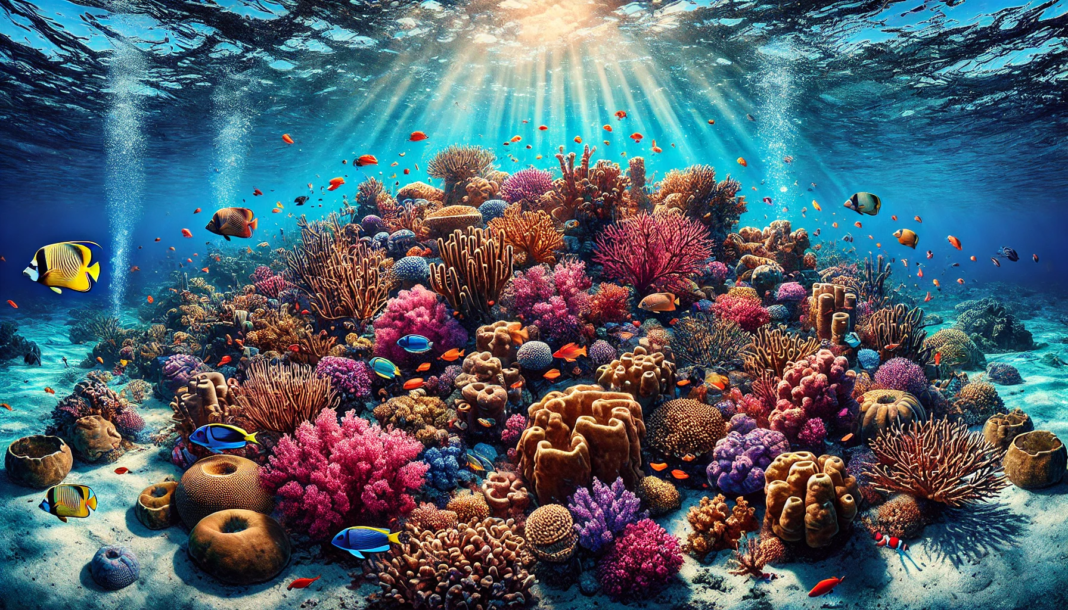Coral reefs are among the most diverse and valuable ecosystems on Earth, providing critical ecological, economic, and cultural benefits.
The Caribbean Sea, home to some of the most extensive and biodiverse coral reefs, plays a vital role in maintaining marine biodiversity and supporting the livelihoods of millions.
This article explores the importance of Caribbean coral reefs, the current health status, and the conservation efforts being made to protect these precious ecosystems.
Importance of Caribbean Coral Reefs
Caribbean coral reefs are essential for several reasons:
1. Biodiversity Hotspots
Coral reefs in the Caribbean are biodiversity hotspots, supporting over 65 species of hard corals and thousands of species of fish, invertebrates, and other marine organisms. These reefs provide critical habitat for many species, including endangered ones like the Nassau grouper and the Caribbean reef shark. They also serve as breeding and nursery grounds for numerous marine species, contributing to the overall health of the ocean’s ecosystems.
2. Economic Value
The economic value of Caribbean coral reefs is immense. They support tourism and fisheries, two of the region’s major industries. The reefs attract millions of tourists annually, drawn by activities like snorkeling, scuba diving, and recreational fishing. This tourism generates significant revenue and provides employment for local communities. Additionally, coral reefs contribute to the region’s fisheries by providing habitat for commercially valuable fish species.
3. Coastal Protection
Coral reefs act as natural barriers, protecting coastlines from the impacts of waves, storms, and erosion. By dissipating wave energy, reefs help prevent coastal flooding and property damage, safeguarding communities and infrastructure. This protective function is increasingly vital in the face of rising sea levels and the increased frequency of extreme weather events.
4. Cultural Significance
For many Caribbean communities, coral reefs hold cultural and historical significance. They are integral to traditional fishing practices, folklore, and local customs. The reefs also have spiritual value for some indigenous and local communities, symbolizing a connection to the sea and nature.
Health Status of Caribbean Coral Reefs
The health of Caribbean coral reefs has been declining due to various stressors. Key issues affecting reef health include:
1. Coral Bleaching
Coral bleaching occurs when corals expel the symbiotic algae (zooxanthellae) living in their tissues, causing them to turn white. This phenomenon is primarily triggered by elevated water temperatures, which can result from climate change. Bleaching weakens corals, making them more susceptible to disease and mortality. The Caribbean has experienced several significant bleaching events, particularly in the past few decades.
2. Overfishing and Unsustainable Practices
Overfishing, particularly of herbivorous fish that control algae growth on reefs, has led to imbalances in reef ecosystems. The removal of key species disrupts the natural balance, allowing algae to overgrow and smother corals. Additionally, destructive fishing practices, such as the use of dynamite and cyanide, have directly damaged reef structures.
3. Pollution
Pollution from land-based sources, including agricultural runoff, sewage, and plastic debris, poses a significant threat to coral reefs. Nutrient-rich runoff can lead to algal blooms, which deplete oxygen levels and block sunlight, further stressing coral ecosystems. Chemical pollutants and microplastics can also harm marine organisms and coral health.
4. Coastal Development
The expansion of coastal infrastructure, such as hotels, resorts, and ports, often leads to habitat destruction and increased sedimentation. Sediments can suffocate corals, reducing light availability and hindering photosynthesis. Additionally, increased tourism can lead to physical damage to reefs, such as trampling by divers and anchors from boats.
Conservation Efforts
Recognizing the critical importance of coral reefs, numerous conservation efforts are underway to protect and restore these ecosystems. Key initiatives include:
1. Marine Protected Areas (MPAs)
Establishing MPAs is a widely adopted strategy for conserving marine biodiversity. MPAs restrict or regulate human activities within designated areas to protect critical habitats and species. In the Caribbean, several MPAs have been established, including the Belize Barrier Reef Reserve System, the Bonaire National Marine Park, and the Saba Marine Park. These protected areas help safeguard coral reefs from overfishing, pollution, and destructive practices.
2. Coral Restoration Projects
Coral restoration involves the cultivation and transplantation of coral fragments to degraded reef areas. This approach aims to accelerate the recovery of coral populations and restore reef structure. Organizations and research institutions across the Caribbean, such as the Coral Restoration Foundation and the MOTE Marine Laboratory, are actively engaged in coral restoration projects. Techniques include coral gardening, where corals are grown in nurseries and later transplanted, and microfragmentation, which speeds up coral growth.
3. Sustainable Tourism and Fishing Practices
Promoting sustainable tourism and fishing practices is crucial for reducing human impacts on coral reefs. This includes implementing best practices for dive operators, such as no-touch policies and the use of mooring buoys to prevent anchor damage. Sustainable fishing initiatives encourage the use of non-destructive gear, seasonal fishing bans, and size limits to protect fish populations. Education and awareness campaigns also play a vital role in encouraging responsible behavior among tourists and locals.
4. Climate Change Mitigation and Adaptation
Addressing the root causes of climate change is essential for the long-term health of coral reefs. Global efforts to reduce greenhouse gas emissions and transition to renewable energy sources are critical for mitigating the impacts of climate change on marine ecosystems. Additionally, local adaptation measures, such as restoring mangroves and seagrasses that absorb carbon and protect shorelines, can enhance the resilience of coastal communities and ecosystems.
Conclusion
Caribbean coral reefs are invaluable ecological, economic, and cultural assets. However, they face numerous threats that jeopardize their health and the services they provide. Through concerted conservation efforts, including the establishment of MPAs, coral restoration projects, and sustainable practices, there is hope for the preservation and recovery of these vital ecosystems. Protecting Caribbean coral reefs is not only crucial for the region’s biodiversity but also for the well-being of the communities that depend on them.
FAQs
What are the main threats to Caribbean coral reefs?
The main threats to Caribbean coral reefs include coral bleaching, overfishing, pollution, and coastal development. These threats lead to the degradation of reef ecosystems and loss of biodiversity.
How can coral reefs be restored?
Coral reefs can be restored through various methods, including coral gardening, where corals are grown in nurseries and transplanted to degraded areas, and microfragmentation, which accelerates coral growth. Additionally, protecting existing reefs and reducing human impacts are crucial for restoration efforts.
What are Marine Protected Areas (MPAs)?
Marine Protected Areas (MPAs) are designated regions in the ocean where human activities are regulated to protect biodiversity and ecosystems. MPAs help conserve marine habitats, including coral reefs, by restricting activities like fishing, mining, and tourism.
How does climate change affect coral reefs?
Climate change affects coral reefs by increasing sea temperatures, which can lead to coral bleaching and ocean acidification. These changes reduce the ability of corals to build skeletons, making them more susceptible to damage and disease.
What can individuals do to help protect coral reefs?
Individuals can help protect coral reefs by practicing responsible tourism, reducing their carbon footprint, supporting sustainable seafood choices, and avoiding products that harm marine life. Additionally, supporting conservation organizations and advocating for environmental protection policies can make a significant impact.

